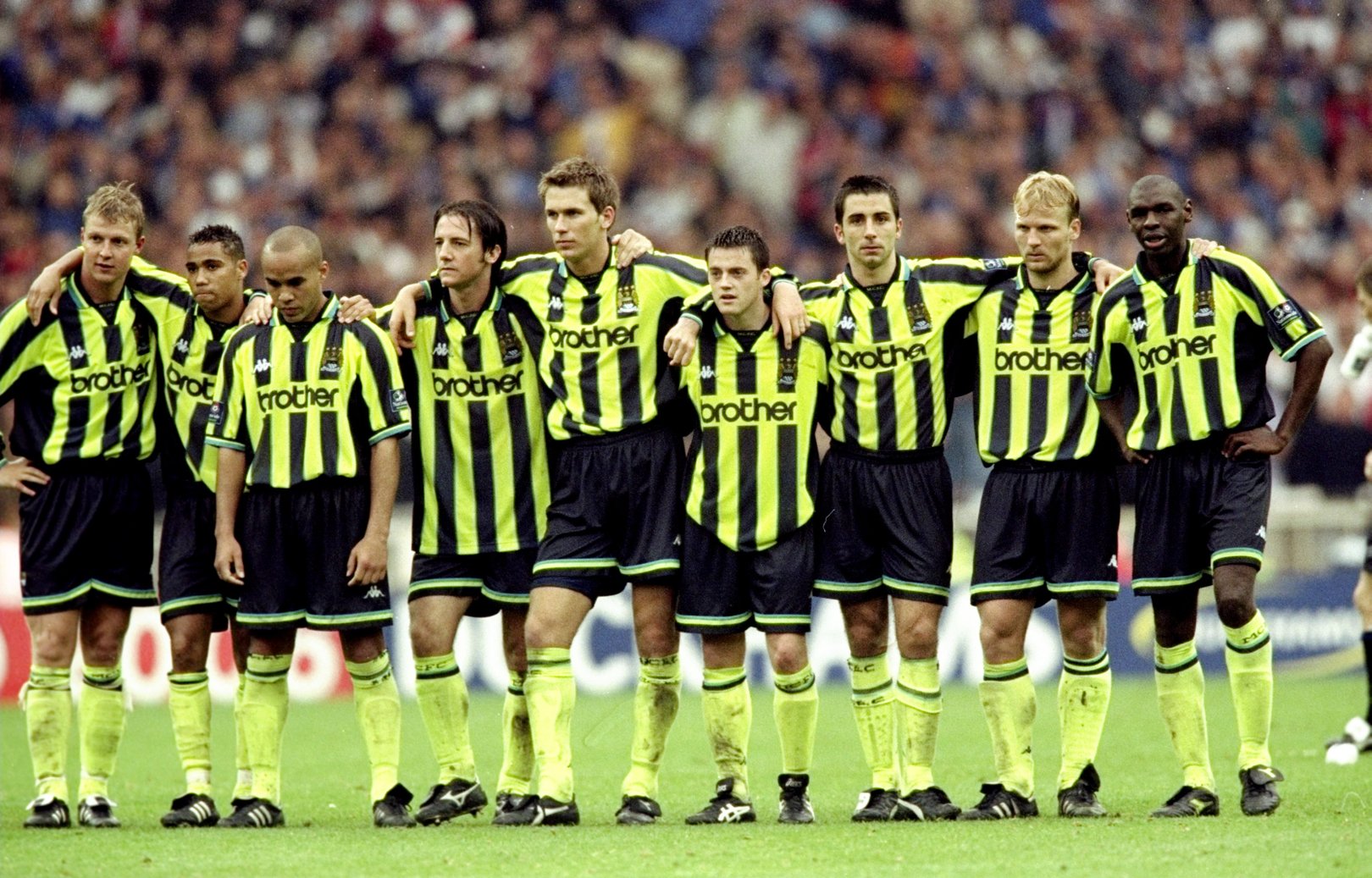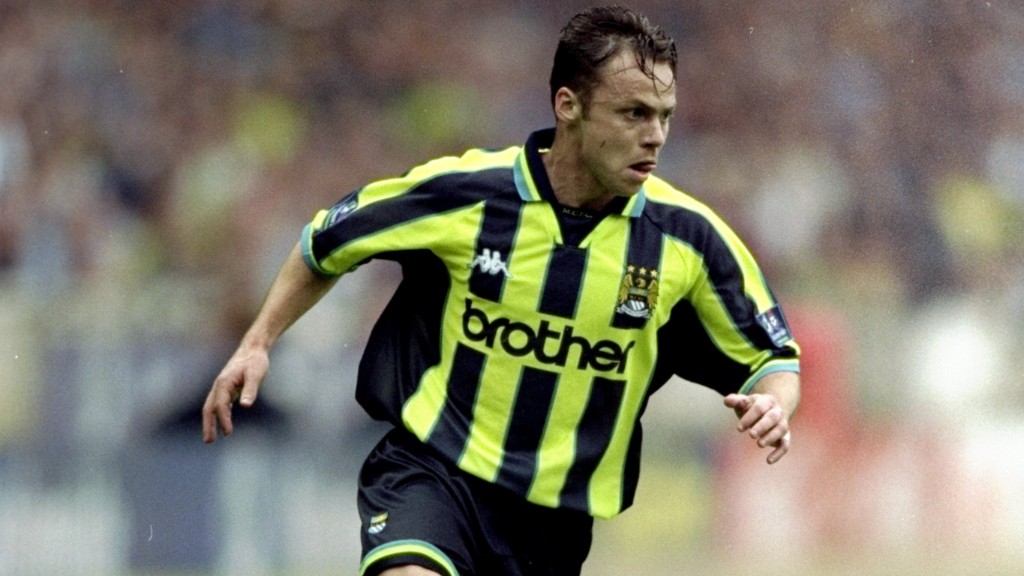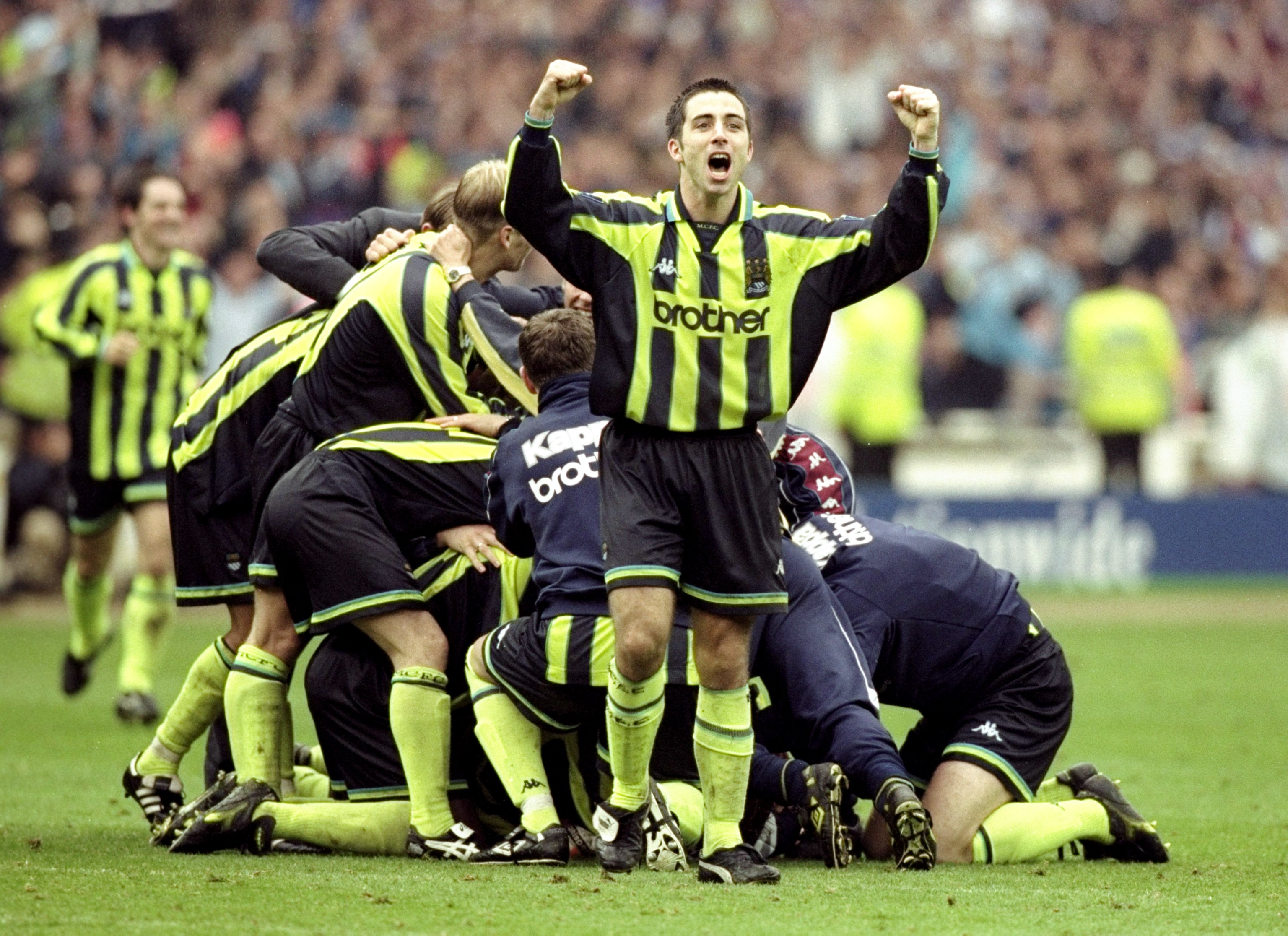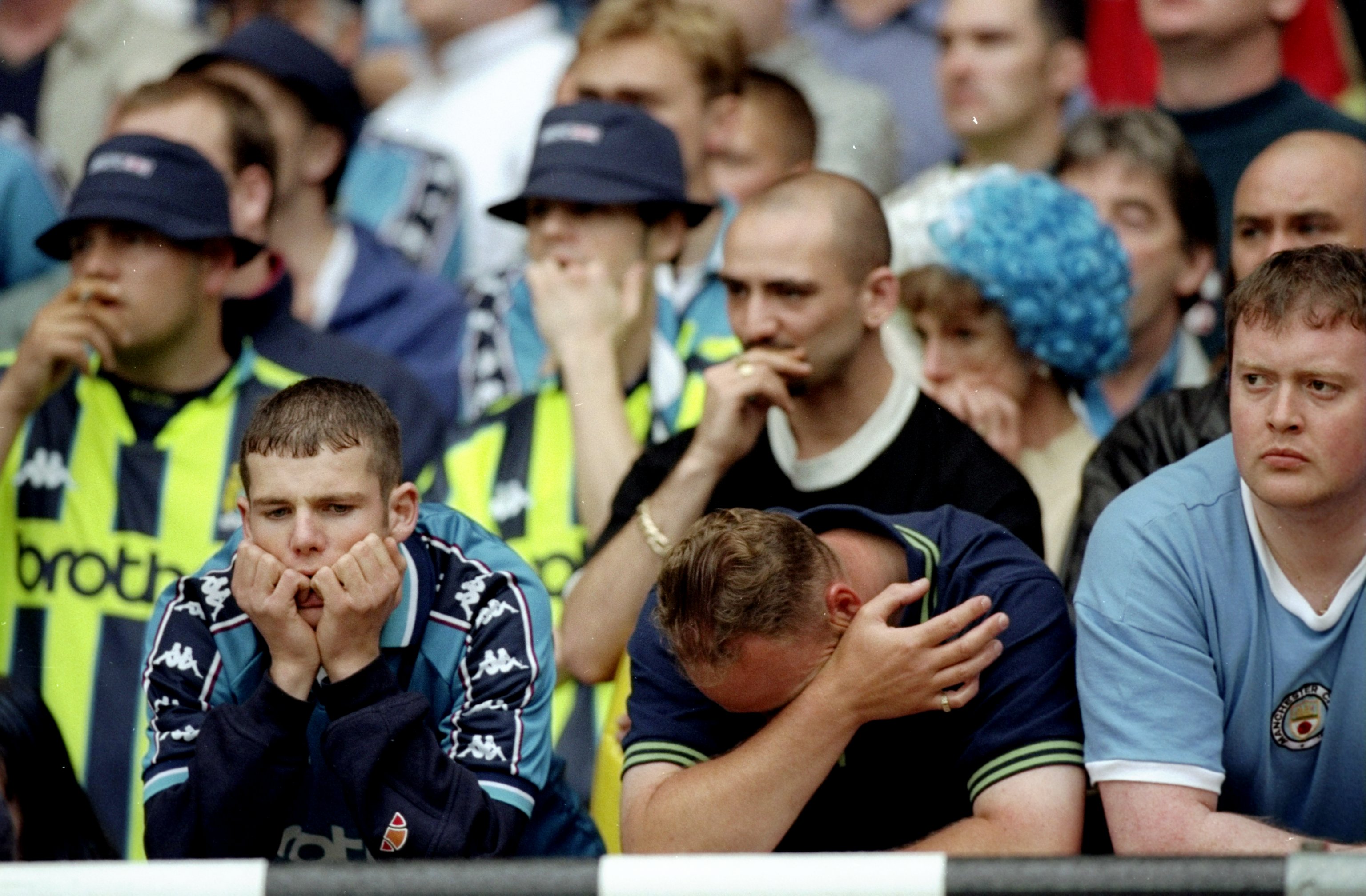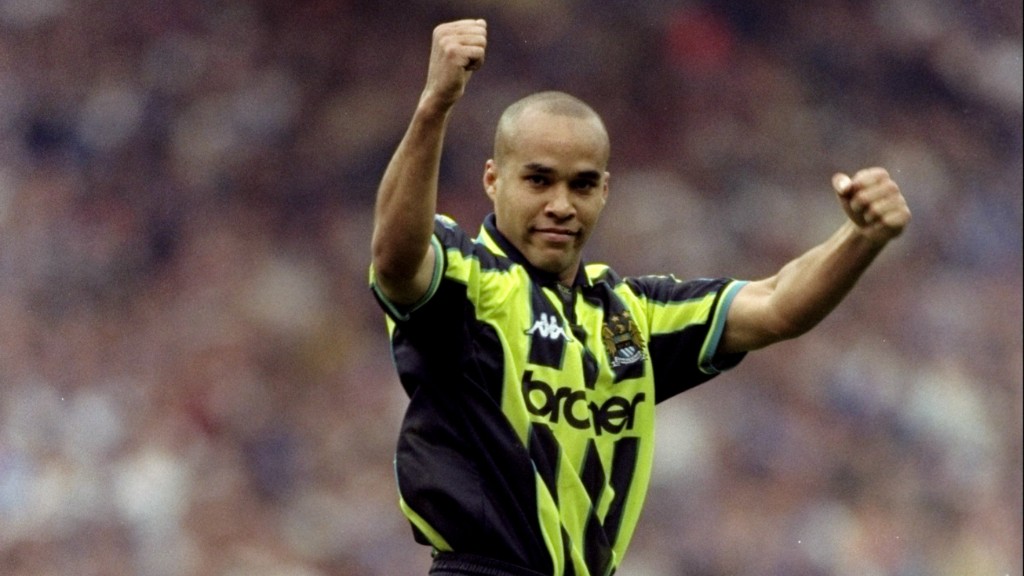Before Sergio Aguero’s 93:20 heroics, the drama of 30 May 1999 at Wembley Stadium, stood out as the most important moment in the Club’s history.
For some, it still is.
Having sunk to our lowest ebb with relegation from Division One 12 months earlier, Joe Royle’s side had to beat Gillingham in the Division Two playoff final.
Another season in the third tier was not option.
Trailing 2-0 as the clock ticked over into the 90th minute, that nightmare scenario loomed ominously large.
What followed will remain part of City folklore for eternity.
Kevin Horlock scored in the final minute of normal time to provide the faintest of hope and five minutes later, the City end was sent into ecstasy by Paul Dickov’s equaliser.
A goalless extra-time meant there would be yet more drama in the lottery of a penalty shootout, where City duly delivered to complete a famous fightback.
This is the story of those eight fateful spot kicks, told by those involved…
Paul Dickov: “People forget their two best players were their strikers. They got taken off at 2-0 so they didn’t have any real threat going forward in extra-time. It went to penalties and there was no doubt we were winning that game.”
Gareth Taylor: “No matter what anyone says in that second period of extra-time everyone has got their head on penalties. Everyone is starting to think ‘am I going to be taking one, where am I going to put my penalty’.”
After 30 nerve-jangling minutes of extra-time, Royle needed one final effort from at least six of his squad; the penalty takers and goalkeeper, Nicky Weaver.
Terry Cooke: “I said yes [to taking a penalty] straight away. As soon as I said it, I remember thinking what have I done. But I was confident in my ability.”
Dickov: “My arm went straight up. I was super confident. The week leading up to it we were practicing penalties in training. I’d tell Weaves where I was going and ask him not to cheat and I’d score every single one.”
Shaun Goater: “I was confident, that’s why I put my hand up because Joe had said we need five penalty takers. He said that knowing who two or three were going to be. I’d say Horlock was definitely one, Dickov would have definitely been one and I think Edgy would have been a definite. And I think from there, Joe probably would have had three in his mind that he wanted to take one.”
Kevin Horlock: “Joe was asking who wants penalties. I backed myself. I’d missed several for City, but I said I’d go first.”
Taylor: “I was on penalties earlier in the season, not long after I signed, and I missed one at Maine Road against Oldham. I actually scored in the game and we won 2-1 but I missed a penalty and I don’t think Joe ever forgave me. So when he was going round with his little pen and paper he kept on sort of not seeing me. I was trying to get in his vision but he was just not seeing me at all.”
Jeff Whitley: “I was starving and feeling weak. I wasn’t down to take one of the penalties. The guys who eventually ended up taking them did an amazing job. You’ve got to be brave to take a penalty in that kind of environment. Don’t get me wrong if I had to take one, I couldn’t have gone ‘no I’m too weak.’ You’d have to take it.”
Nicky Weaver: “I fancied my chances saving maybe one, maybe one out of five is a fair chance. There’s no real pressure on the goalkeeper.”
The players took their penalties in front of the City fans, who made their presence known…
Horlock: “The penalties were an advantage at the City end, if you win. At the old Wembley the crowd was so far away they didn’t really have an affect like they would in a league game. I look at it in a different way, I think it added pressure a little bit.”
Weaver: “I think a big thing going into the penalties is that it was at the City end. No disrespect to the Gillingham players, but they weren’t used to being on the big stage. Neither were we to be fair. The goal must have got a little bit smaller and I a little bit bigger when the penalties were at the City end.”
Goater: “It is an advantage but if you’re not confident it can be a disadvantage to be going against your own fans. All the players that stepped up were brave.”
Horlock had the responsibility of taking the first penalty and ensured City got off to a good start, appearing to be coolness personified as he sent goalkeeper, Vince Bartram, the wrong way.
Horlock: “Watching it back, I can see the fear in my face. I can tell I am scared. And I am man enough to own up that I was scared. I knew what it meant. I knew what the repercussions would be if we didn’t win that penalty shootout. I didn’t want to let anyone down, so I was nervous and scared, probably more so than I ever was. I changed my mind loads of times walking up. I joke about it now that I waited for the keeper to dive the right way. I’m lying. I changed my mind running up to the ball. I was going for power and in the end I’ve gone to the goalkeeper’s right.”
Weaver went the right way to keep out Gillingham’s first effort from Paul Smith and give City the advantage, before Dickov stepped up. In the minds of his team-mates he was certain to score, but the striker saw his shot rebound back off both posts in agonising fashion.
Weaver: “There was no research – it wasn’t what you did then. Nowadays, there are iPads out and you can see the penalties from the last few years but there was none of that – just go with the gut instinct and luckily I saved the first one. That set up the next few.”
Gerard Wiekens: “They went first and missed. That was a good feeling and that helped us. Nicky saved one and then they missed one. During the shootout you thought we’re going to do it.”
Dickov: “Going up to take it I was super confident and I’ve hit it clean. It hit the post and it’s still going in, but it came out again. I felt every emotion possible in one match.”
Tony Vaughan: “We’d practiced penalties at Maine Road the day before and the one person you would have put your mortgage on was Dicky. We had Nicky Weaver in five-a-side goals and Dicky was smashing them past him left, right and centre, so that was a surprise.”
Horlock: “We felt for him [Dickov]. We were in it together. Whoever missed the penalty that day, we all missed together.”
Goater: “It was like a pinball machine. I was just waiting for it to hit the net. We couldn’t be upset because we got to that moment because of Paul. I guess City fans were thinking typical City at that point, but we couldn’t complain because Kevin stuck his in earlier and we knew we were still in an OK position.”
Weaver: “It was a decent penalty. The week leading up to it, we practiced penalties every day and Dicky never missed. I knew exactly where they were going but I couldn’t get there so when he walked up, I’d almost given him the goal.”
The advantage stayed with City when Adrian Pennock blazed the Gills’ second penalty wide, before Cooke expertly guided his effort into the bottom corner to put us 2-0 up.
Cooke: “I remember walking up slowly. As soon as the ball was handed to me the last thing I wanted to do was look at the keeper. I remember looking at the goal and it just felt like it had shrunk to a five-a-side net. Their keeper looked huge.
“I put the ball on the spot, turned my back on the goal and thought: ‘I’m hitting this hard and low’. I had a side to go to, which was my left – the ‘keeper’s right – and as soon as the whistle blew, I turned back to the goal, head down and just hit it. Luckily, I hit it quite well into the bottom corner and relief just came over me.”
An unstoppable strike from Gillingham midfielder John Hodge left City 2-1 up after three penalties each. Boyhood Blue Richard Edghill was up next for City and emphatically fired one into the top right corner via the underside of the crossbar.
Horlock: “I’ll openly say it: ‘I was nervous for Edgy. I knew how much City meant to him, but he was a defender that didn’t score many goals. So, for him to actually step up and take one was so brave – and it was probably the best penalty we had. Whether it was more luck than judgement, I don’t know. I say he shanked it, which means he mis-hit it, but it was an unbelievable penalty. He left no room for error so I was buzzing for him, and you saw by his celebration how much it meant. He kissed the badge, which he got stick for, but I understood.”
Whitley: “Some of them were fantastic. Richard Edghill banged his into the top corner. It was just fantastic to watch.”
Edghill’s successful strike left the shootout in a sudden death scenario, with Guy Butters the next man up for Gillingham.
Weaver guessed correctly to the delight of the City fans and players who chased our shootout hero down as he embarked on his iconic lung-busting celebration. It was job done. City were going up.
Goater: “I was counting. I was like am I going to have to take one? It’s easy to say now, in hindsight, that I was confident to take one, but at the end of the day I just wanted us to win. If I didn’t have to take one then I was very happy because the point was to win and get promoted.”
Whitley: “What Weaver did, it was just incredible and I don’t think he gets as much credit. He was fantastic that season, even more so in that game.”
Cooke: “I had no doubts because Nicky Weaver was a top keeper. He was young, enthusiastic and an outstanding keeper. He always had it in him to save penalties. We knew we had a quality keeper in goal for us that day, then it turned out he saved two. His presence will have instilled a bit of doubt into the opposition players.”
Dickov: “I was actually the last one on the pile on top of Weaves and in the time I’ve got to congratulate him I thought I had to get the defibrillator. He’s never ran that far or quick in his life. He deserved it. That was his first full season of professional football and he was unbelievable for us so that was the icing on the cake for him as well.”

